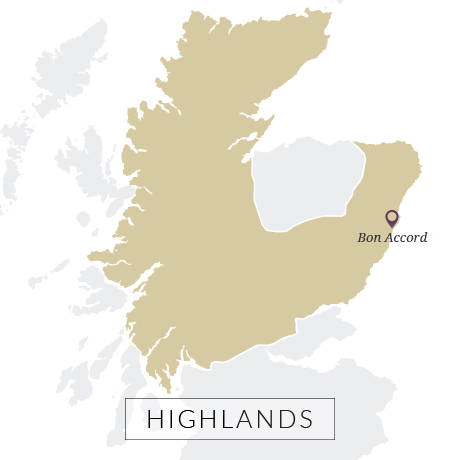Wolf of Badenoch
Finishing in a French oak prunelle liqueur cask gives this single malt a fruity edge.


Bon Accord is something of a Frankenstein distillery – established using the stills and vessels of the failed Union Glen distillery, transported into the shell of the former brewery next door.
The ‘lively’ rivulet of the Ferry Hill Burn ran past the distillery on its way down toward the River Dee, although it wasn’t used as a water source.
Bon Accord was a successful enterprise for its time, producing more than 300,000 gallons (roughly 1.4 million litres) a year on its four pot stills, mostly sold duty free on to ships as Cock O’ The North. However, the distillery was hit by three fires in its history. The last, in 1885, being particularly disastrous.

The site of Bon Accord – meaning ‘good agreement’, a term largely used by Scots to identify one another from the invading English – was originally a brewery (built in 1785) adjacent to the Union Glen distillery, both of which had failed in 1853/54.
Bon Accord distillery was established in 1855 and in 1876 was sold to The Bon Accord Distillery Company Limited, which made extensive alterations and improvements. The firm prospered until a fire in 1885 almost totally destroyed the premises. The distillery was rebuilt but never fully recovered.
In 1896 Bon Accord Distillery Co. Ltd. ceased trading and the distillery and its assets were acquired by Dailuaine-Talisker which operated it under the name North of Scotland until its closure in 1910.
Half a century later, distiller and blender George Christie acquired the North of Scotland name and applied it to his column still grain distillery near Alloa.
The area of Aberdeen where Bon Accord once stood is now residential.
Cock O’ the North – a brand name once used by Bon Accord – was revived in recent years, this time applied to a whisky liqueur produced using malt whisky from Speyside distillery, also built by Christie.


 Brand
Brand
Finishing in a French oak prunelle liqueur cask gives this single malt a fruity edge.


 Brand
Brand
Blended grain whisky designed for club serves and named after the Roland TR-808 Drum Machine.


 Distillery
Distillery
Also called House of Burns, a lost distillery at Monzievaird, near Crieff in Perthshire.


 Distillery
Distillery
A lost distillery that operated somewhere on Aberdeen’s northern edge in the late 18th century.